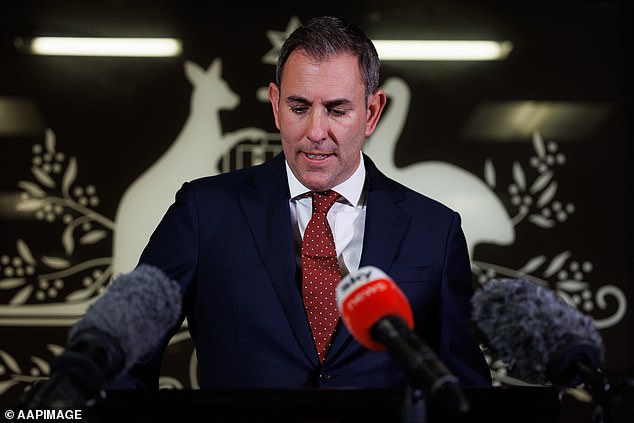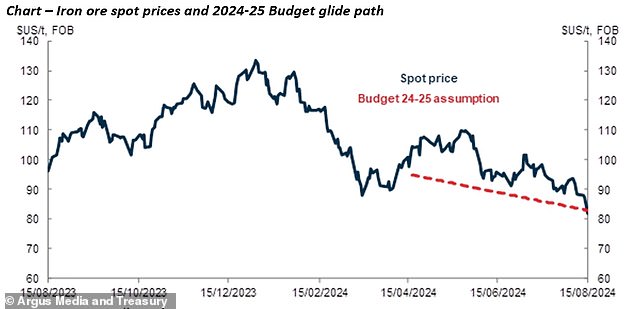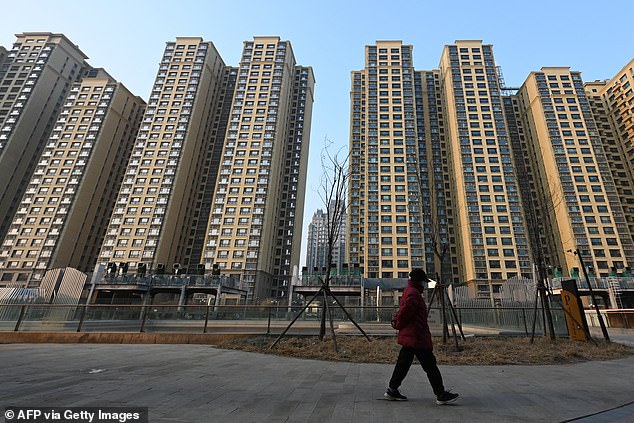The crisis in China’s steel industry and a crackdown on its debt-ridden property developers will cost the Australian government $3 billion in budget revenue.
Treasurer Jim Chalmers has released new analysis predicting that a worse-than-expected fall in the price of iron ore, Australia’s biggest export, will reduce corporate tax revenues over the next four years.
“We are monitoring these developments very closely because of their potential impact on our economy and our budget,” he said.
‘The weakness of the Chinese economy and the recent fall in iron ore prices are another reminder that we are not immune to volatility and uncertainty in the global economy.’
The Treasury’s May Budget predicted that iron ore prices would halve to just US$60 per tonne by the March quarter of 2025, down from levels then exceeding US$100 per tonne.
By the close of trading on Thursday, iron ore had fallen to $81.80 a tonne, hitting levels not seen since 2022, as China bought less of the commodity used to make steel.
That was below the $83 a tonne level the Treasury had forecast for August 2024, in another sign that economic weakness in China, Australia’s biggest trading partner, will be felt in Australia for years to come.
Every $10 per tonne drop in iron ore prices equates to a loss of $500 million in potential government revenue.
China’s steel industry crisis and a crackdown on its debt-ridden property developers will cost the Australian government $3 billion in budget revenue
Iron ore prices have plunged 7.5 percent in the past week alone after China’s Baowu Steel Group, the world’s largest steelmaker, warned that the crisis in the steel industry was worse than expected.
Hu Wangming, chairman of the corporate giant, said at Baowu’s semi-annual meeting that the results were “harder to bear than we expected.”
The steel crisis comes just six months after a Hong Kong court ordered apartment construction giant Evergrande to be liquidated, with developer Country Garden also in jeopardy.
Vivek Dhar, head of mining and energy commodities research at Commonwealth Bank, said Baowu Steel’s comments had spooked financial markets.
“It’s true that margins are very, very low and they’re at sufficiently negative levels that the comment is something like, ‘Wow, the steel sector is haemorrhaging,'” he told the Daily Mail Australia.
Mr Dhar said Evergrande’s collapse had actually worsened demand for Australian iron ore from early 2024.
“These issues have really accelerated since Evergrande,” he said.
Mr Dhar said housing construction accounted for 30 per cent of steel consumption and added that a slowdown in spending on transport infrastructure was also weighing on iron ore demand.
“Weak demand for steel has put enormous pressure on steel prices,” he said.

Treasurer Jim Chalmers has released new analysis predicting that a worse-than-expected fall in the price of iron ore, Australia’s biggest export, will reduce corporate tax revenues over the next four years.
In 2020, Chinese President Xi Jinping’s Communist Party government imposed a “three red lines” policy on apartment developers to address an oversupply crisis that has led to ghost towns.
This has caused property prices to plummet: China’s National Bureau of Statistics shows a 4.9 percent drop in the year to July.
Existing homes fared even worse, with values plummeting 8.2 percent over the year, even though residential construction starts are 60 percent below the 2021 peak.
Anthony Albanese is the first Labor Prime Minister since 1989 to preside over two consecutive budget surpluses.
But the $9.3 billion surplus for 2023-24 was underpinned by high iron ore prices that boosted corporate tax revenues.
The budget deficit is forecast to reach $28.3 billion in 2024-25, rising to $42.8 billion in 2025-26.
Lower tax revenues from iron ore shipments to China are expected to translate into larger budget deficits than the Treasury had anticipated unless there are severe cuts in government spending.
The Treasury quotes iron ore prices before freight costs are included, which are typically about $10 a tonne lower than the figure with transportation costs included.

By the close of trading on Thursday, iron ore prices had fallen to US$81.80 per tonne, hitting levels not seen since 2022, as China bought less of the commodity used to make steel.


